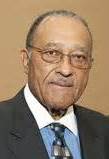Henry Ell Frye '59, Distinguished Service Medal Citation
Posted on May 9, 2014(Editor’s Note: The GAA’s Distinguished Service Medal citations, such as this one, are read to the audience at the Annual Alumni Luncheon and then presented as a keepsake to the recipients.)
If Henry Frye ’59 (JD) were to sum up his life in one of his famous poems, he would find a way to make “integrity,” “courage,” “grace,” “public-spirited” and “genuine” rhyme.
Henry was the first African-American student to enroll in the UNC law school as a first-year, in 1956. His resume lists a number of firsts and onlys for African-Americans in North Carolina: one of the first to be appointed an assistant U.S. attorney, 1963; the first elected to the House of Representatives in the 20th century, 1968; one of the first to open a bank in the state, 1971; the only state senator in his time, 1981-82; the first to be appointed to the state’s highest court, 1983; and the longest-serving jurist in the state.
And, of course, Henry became the N.C. Supreme Court’s first African-American chief justice, in 1999.
Henry grew up in Ellerbe in Richmond County. He received his undergraduate degree in science from N.C. A&T, followed by two years in the Air Force. Though his mother wanted him to become a man of the cloth, Henry held a deep-seated belief in the law as the underpinning for a strong society. He chose Carolina because most of the lawyers and judges he knew of had law degrees from here. “I figured there must be a reason for that,” he said.
Many of his professors reinforced that vision of success by peppering their lectures with comments such as, “When you serve in the Legislature …” or “Once you’re on the Supreme Court …,” and that bolstered Henry’s belief in civic virtue.
He wanted the law to work for all people, especially after his experience trying to register to vote. He was told he first would have to pass a test that asked questions about the Constitution and signers of the Declaration of Independence — a literacy test. He was a law student at the time, and he challenged the requirement. The clerk marked him as failing the test because he had refused to answer the questions, and he was turned away. Years later, as a senator, he shepherded through a bill to repeal the constitutional amendment that required literacy tests for voter registration.
UNC System President Tom Ross ’75 (JD), who led the state’s Administrative Office of the Courts at Frye’s behest, said he’s never seen Henry lose his composure, even under the most trying circumstances.
Throughout his career, Henry strove to have an effect on people’s lives and to strengthen communities, and he considers those experiences his most satisfying. He organized and ran Greensboro National Bank, now Mutual Community Savings Bank. Later, as a lawyer in private practice in Greensboro, he represented a woman in Salisbury whose property was being acquired for redevelopment. An African-American woman, she had been unable to find a lawyer in Salisbury to take on her case. Henry went on to win fair-value compensation for several people in a poor section of Salisbury whose land was being seized.
That determination doesn’t surprise Jim Exum ’57, who was a lawyer in Greensboro when Henry practiced there; the two later served together on the Supreme Court and once ran against each other for a House seat. “Henry is a person of firm beliefs, genuinely held,” Jim said. “He’s not someone who can be stampeded into taking positions. He’s a very careful, thoughtful man who thinks things through thoroughly.”
Though he tends to shy away from the spotlight, except to read his impromptu poetry, Henry has been honored with UNC’s Distinguished Alumni Award and its Davie Award, the Board of Governors’ University Award and a Distinguished Alumni Award from N.C. A&T. Add to that the NAACP’s Humanitarian Award, the Harvey Beech Award from the Black Alumni Reunion and other awards from the N.C. Academy of Trial Lawyers and the N.C. Association of Black Lawyers. He returns to UNC regularly to judge a moot court competition, and he shares the honor of Elon University’s Billings, Exum & Frye National Moot Court.
Now, about that poetry. Willis Whichard ’62 (’65 LLBJD), who served in the House with Henry, said Henry would end the closing day of every legislative session with a poem that captured the work that had been done and the personalities involved. The more he did it, the better he got, and he began sketching poems during the numerous awards dinners when he was asked to speak. With any luck, he’ll do it again today, because
That Henry Frye,
He’s a great guy.
He inspires us all to reach so high.
The GAA’s Distinguished Service Medal has been awarded since 1978 to alumni and others who have provided outstanding service to the GAA and/or to the University. The award is presented at the annual Alumni Luncheon on the weekend of reunions and Commencement in May. Recipients of the 2014 Distinguished Service Medals are W. Lowry Caudill ’79 of Durham, Donald W. Curtis ’63 of Raleigh, Henry E. Frye ’59 (JD) of Greensboro, Julia Sprunt Grumbles ’75 of Chapel Hill and Dr. Hugh A. McAllister Jr. ’66 (MD) of Houston.

